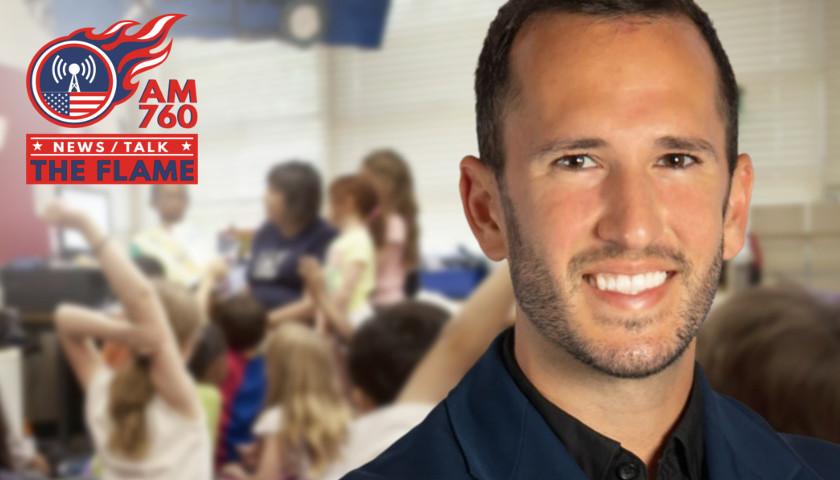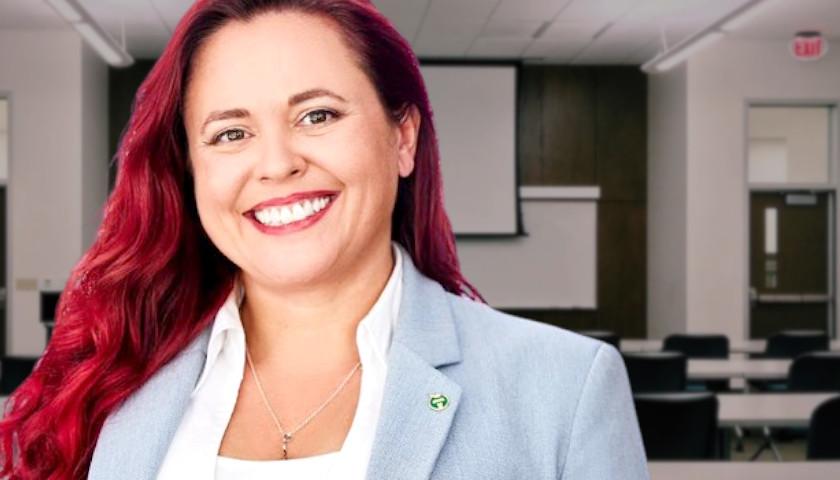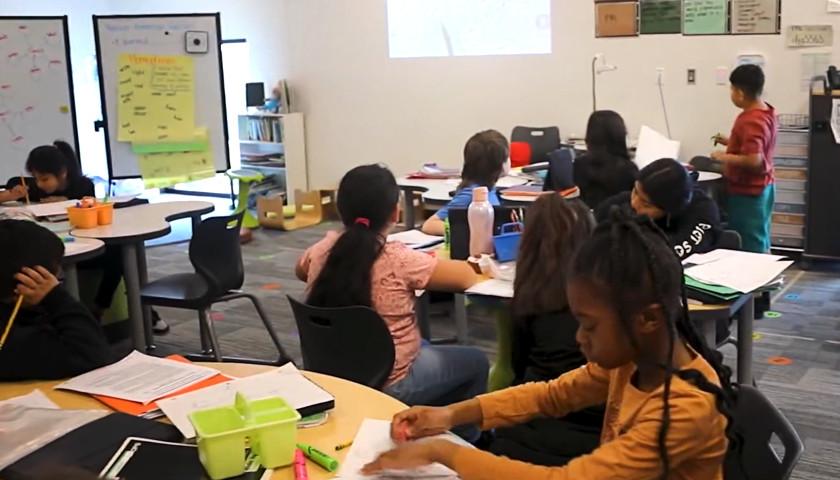Education expert Corey DeAngelis joined The Tennessee Star Report with Michael Patrick Leahy on Monday to discuss a little-known detail about the Tennessee Education Freedom Act that makes the proposal a win-win for teachers, parents, students, and even teacher unions.
DeAngelis goes on to highlight the success of school choice programs in Arizona and Florida, where thousands of families have opted for alternatives to traditional public schools.
TRANSCRIPT
Michael Patrick Leahy: 11:33 AM; broadcasting live from our studios in downtown Nashville – about a quarter mile away from the state capitol.
In-studio, all-star panelist, Crom Carmichael.
Crom, we have a terrific guest on the newsmaker line.
On our newsmaker line, we welcome our friend Corey DeAngelis, a senior fellow with the American Federation for Children.
Good morning, Corey.
Corey DeAngelis: Hey, good morning. Thanks so much for having me.
Michael Patrick Leahy: Well, let me tell you one of the things I like about you. You ready?
Corey DeAngelis: Let’s go.
Michael Patrick Leahy: All right. You went to the University of Texas at San Antonio.
I like that, right? And you got a PhD in education policy, but you got it not from Harvard; not from Yale; not from UC Berkeley. You got it from the University of Arkansas. Which means you have common sense. And you’re not a plagiarist.
Corey DeAngelis: It means I’m a doctor, but not a real doctor. More like a Jill Biden doctor.
Michael Patrick Leahy: That’s funny.
Well, Dr. Corey and DeAngelis, you are also, I think, one of the leading experts on school choice out there. And of course, Corey, here in Tennessee, Governor Bill Lee has introduced the Tennessee Education Freedom Act, which will provide scholarships of $7,000 in year one, it’ll go to 20,000 kids – half of whom are in certain income categories.
And in year two, it’ll be open to everybody.
Tell us a little bit about that proposal.
Corey DeAngelis: Right. This is a universal school choice proposal and it’s on the Republican Party platform. So Tennessee should have no problem getting it done. We’ve had 10 states go universal on school choice.
What do I mean by that?
Every single family is eligible regardless of income, background, or zip code. There’s no more picking winners and losers when it comes to school choice. Everyone would be empowered to take their children’s education dollars in Tennessee, about $7,000 per kid. To the education provider that works best for them, whether it’s a public or private school.
And look, ten other states have done this. They’ve all had GOP trifectas, meaning the Republicans controlling both chambers and the governor’s office – except for North Carolina, that’s the most recent state that did it with the Democrat Governor Roy Cooper, who is a hypocrite on school choice, sent his own kid to private school.
We see this all the time. And then even declared a state of emergency over school choice because he knew he didn’t have the power to veto the Republican legislature on that bill. Every single Republican in North Carolina signed on in both chambers. So Tennessee should be able to get it done, too.
Parents have woken up. They’ve seen what’s happening in so many classrooms, and they want more options for their kids. They don’t want to be forced to send their kids to institutions that aren’t aligned with their values.
Michael Patrick Leahy: Corey, our original all-startar panelist, Crom Carmichael, has a question for you.
Crom Carmichael: Yeah Corey, you said that the governor of North Carolina, so did he veto the bill for school choice?
Corey DeAngelis: He knew he couldn’t veto it because each chamber had 60 percent signed on, all Republicans. So, they had to veto override power, so he let it come into law – he didn’t sign it, but he didn’t veto it either because he was powerless and so he was in a rock and a hard place.
Everybody knew he was a huge opponent – he was tweeting against it basically every day and called the state of emergency over it.
You’d think he’d call a state of emergency over the 15 percent proficiency rates in U. S. history in his schools, but no, instead, it was over a threat to the public school monopoly, and his donors the teachers unions, which is what this is all about.
Opposition is all about power. It’s not about logic or what’s right.
If you look at along cross party lines, Republicans, Democrats, and Independents, on the ground, when you look at the voters, they support school choice. It just so happens that the Democratic Party is owned by the teachers union.
That’s why they oppose it.
Crom Carmichael: Couple of questions then. So what you’re saying is, if the governor of North Carolina, the Democrat, ever claimed that he allowed school choice to become law to try to claim some victory there, that would be disingenuous at best, and a big fat lie would be more accurate.
My question is this, we’ve now had school choice in some states for a number of years. Tell us, based on the data, why school choice is the way to go.
Corey DeAngelis: Well, just based on logic, education funding is meant for educating the child, not for protecting a particular institution, whether that’s public or private.
So the money should follow the student to wherever they want to get an education. And if that’s the public school, great. If you like your public school, you can keep your public school – but for real this time, not like with your doctor – and all across the nation, we’ve had decades of evidence and research, 29 studies on the subject finding.
And looking at the topic and 26 of those 29 studies, the overwhelming preponderance of the evidence finds that school choice leads to better outcomes in the public school. So those fear mongering about school choice saying it’s going to hurt public education in some way.
My first response is, well, public education doesn’t have to happen in government run schools.
It can happen in private schools, too.
But secondly, the data is overwhelmingly on our side. That school choice is a rising tide that lifts all boats. Competition is a great thing in every industry, including in K-12 education. So the public schools get better, not worse. This is a win-win solution. It’s good for the kids getting another opportunity, obviously, who get the scholarships.
It’s good for families and the customers of education, but it’s good for the students who remain in the public schools, too. And the public schools themselves financially benefit on a per-student basis. The scholarship is only about $7,000 or $8,000 a kid.
If you’re losing about $8,000, the state portion of the funding, but you get to keep the local and federal funding, which the public schools do, they get to keep thousands of dollars for students who are no longer educating.
So on a per-student basis, the public schools end up more well off from a financial standpoint. This is a win-win.
Michael Patrick Leahy: That’s the first time I’ve heard that argument, and it’s quite compelling. Because, typically, let’s take here in Tennessee, right? Depending upon the school district 10 percent comes from the Feds 40 percent to 50 percent comes from the state, 40-50 percent locally.
So what you’re saying is that if the state money, that 40 or 50 percent doesn’t, it goes elsewhere, the local schools still get to keep the Fed and local money, right?
Corey DeAngelis: That’s correct. And it’s pretty ridiculous when you think about it in terms of an analogy.
Think about if you stopped shopping at Walmart for whatever reason, and you wanted to go to Trader Joe’s, Safeway, or whatever other grocery store that’s nearby, and Walmart got to keep half of your grocery funding each week.
That wouldn’t make a lot of sense, but it would be a good deal for Walmart – and I argue that school choice is similarly a good deal for the public schools.
They get to keep any money for students who are no longer educating. The problem is that Union monopoly wants to keep 100 percent of the funds even after the students leave.
But realistically speaking, getting to keep about half or even close to that amount is a win-win.
Michael Patrick Leahy: So I think the states that have done this for a while – Florida, Arizona, Indiana, Iowa, I think they’ve done, there’s a few others – how many kids have been participating in those schools? In the Education Scholarship Program?
And what percentage of all kids are in this scholarship program?
Corey DeAngelis: Yeah, it depends on the state, but families have been flocking to these programs over the past couple of years, partially because the unions really overplayed their hand by showing parents what was happening in the classroom.
Families who thought their kids were in schools that were great based on test scores started to see that values-based education is another important dynamic when it comes to school quality, too.
But if you look at Arizona, for example. They had one of these Education Freedom Account programs for over a decade already, and they expanded it to everybody, regardless of background, last year.
Well, in just one year, from before the expansion, they had about 10, 000 students participating. Now, you fast-forward a year later, they have about 60,000 to 70,000 students participating in that initiative in Arizona, where everybody is eligible. This is why the status quo is so terrified of giving families a choice.
The main argument they make is, well, this is going to defund the public schools. My quick response to that is what I said earlier, well, they actually are financially better off. But then two well, the question is, why would that happen? Flock your schools if they’re doing such a fantastic job. The best schools would welcome the competition; they shouldn’t be afraid of giving families choices.
So that’s just one example of Arizona, though, where families have really flocked to these alternatives.
In New Hampshire, though, they have more of a targeted program. It’s about 1 percent or 2 percent of the statewide population.
In Florida, they have, the last data that I’ve heard, But since they’ve expanded universal, which they did this year, they now have about 400,000 families enrolled in their scholarship program in Florida.
And since Florida’s expanded school choice, the GOP has expanded their to super-majorities in both chambers. So it’s not just the right thing to do. It can be a political winner for the Republican party too. It’s the only thing that Republicans can really “give away” that actually decreases government size while increasing personal liberties and freedom and having more of a say in your kids’ education.
Those voters become more of a single-issue voter in support of Republicans, especially from historical voters that wouldn’t come out in support of Republicans in the past. For example,for DeSantis in 2018, he owes his victory that was a slim margin in 2018. He barely beat Andrew Gillum, the Democrat opponent.
And the Wall Street Journal, in an opinion piece, claimed that school choice moms tipped the governor’s race for DeSantis because his opponent was calling to get rid of that massively popular program. And it was overwhelmingly non-white families and low income families using the program. And according to exit polls, DeSantis extremely outperformed with black moms who were disproportionately benefiting from that program.
Crom Carmichael: Corey, a couple of questions on this. Because you said Arizona the number of parents who’ve taken advantage of school choice in Arizona has gone up tremendously. And you said the same thing in Florida.
Are there entrepreneurs – private school entrepreneurs – who are opening up new schools to meet those needs? With a business model that is different than a typical private school business model?
Corey DeAngelis: Yes. And it depends on the state, again; but in Florida, for example, step up for students has analyzed the data on this over the past couple of decades.
And even in the most rural counties in the state, the number of private education operators has doubled. So a supply isn’t fixed. And if you give the money to the parents, supply will meet that demand just like it does in any other industry.
But in places like Arizona, they have a thriving micro-school sector, including one of the biggest providers called Prenda Microschool.
It’s basically the concept of the one-room schoolhouse reimagined where five to 10 children get together in a household and families can basically economize on the process of homeschooling. You don’t have to build another brick and mortar school with these microschools that over the past few years, people were calling them pandemic pods, but it’s basically the same idea.
Where you don’t have to build a new school, you can use a household or other area. And it’s kind of like you get the benefits of homeschooling when it’s more like a one on one between the teacher and the student. But you also get some of the community-building by having some other families and children getting together to socialize.
So that’s the model.
Michael Patrick Leahy: Corey DeAngelis, you’re doing your graduate program where you got your PhD at the University of Arkansas Proud.
Very well done as the senior fellow with the American Federation for Children. Corey, thanks so much and come back again and give us an update on this.
Corey DeAngelis: Absolutely. Looking forward to seeing this bill make it across the finish line in Tennessee.
Michael Patrick Leahy: We’ll be right back. This is the Tennessee Star Report. I’m Michael Patrick Leahy.
– – –
Listen to The Tennessee Star Report with Michael Patrick Leahy weekdays from 11:00 am to 1:00 pm on WENO AM760 The Flame.








